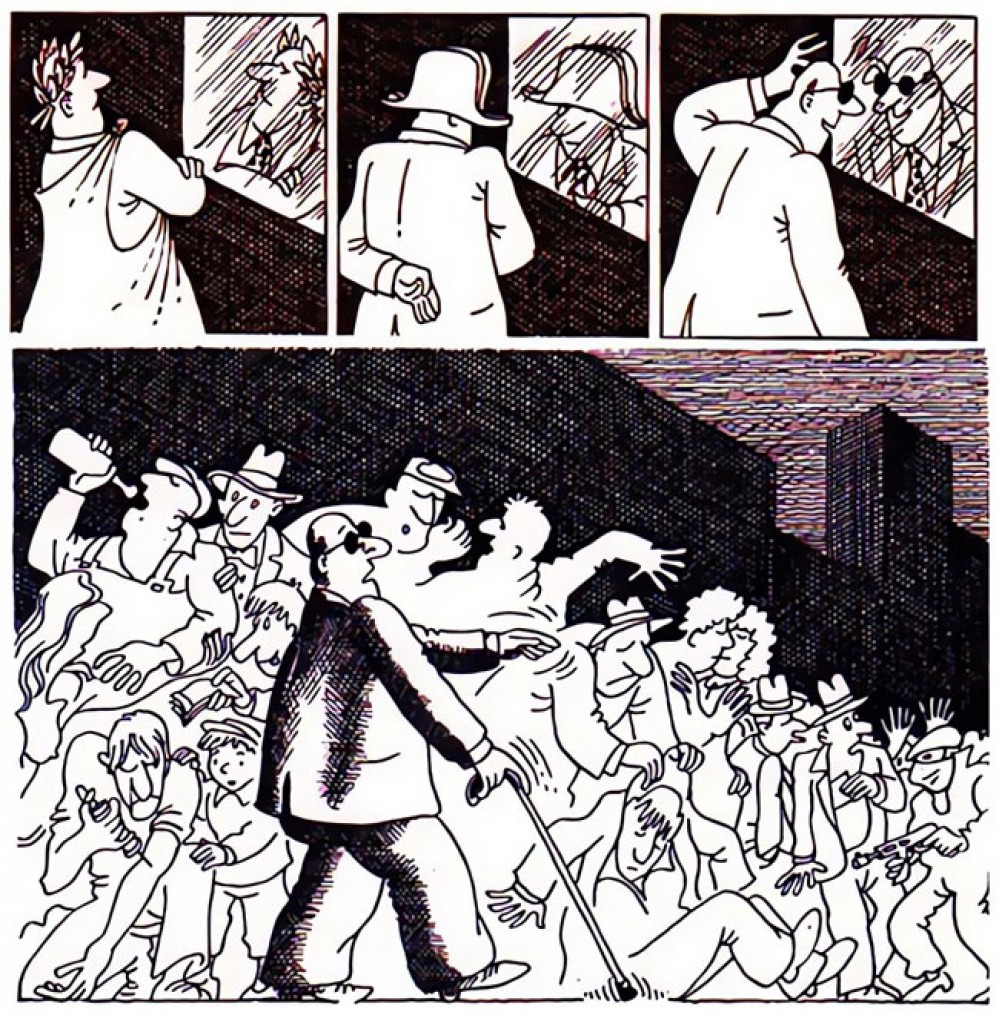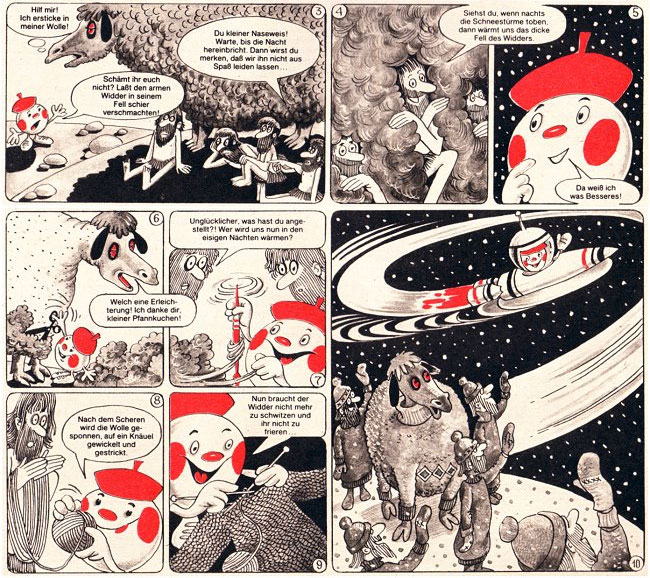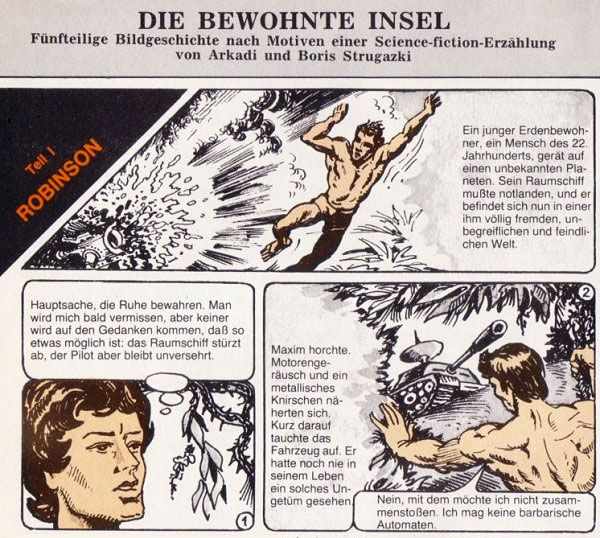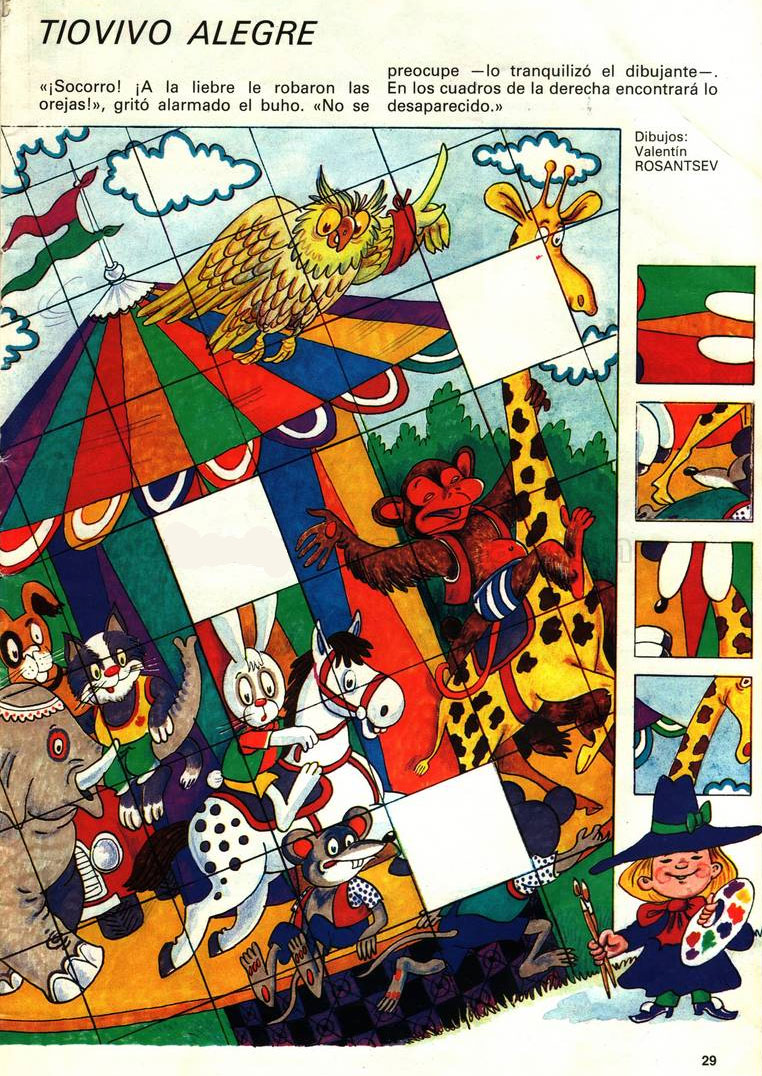Cartoon by Valentin Rozantsev.
Valentin Rosantsev (also written as Rosanzew) was a Russian cartoonist. While he worked for Soviet-controlled newspapers like Izvestja, he also participated illegally in international cartoon contests with more satirical cartoons. His comic book adaptations of classic Slavic folk and fairy tales were also published in German in the DDR magazines Freien Welt and Sputnik.
Early life and influences
Born in Moscow in 1939, Valentin Fjodorovitsj Rozantsev initially worked as an engineer. With a scarce salary of 98 rubles and a young family at home, he tried his luck at cartooning. In 1964, he saw his first caricatures published. In a 2010 interview with caricatura.lt, Rosantsev said he initially didn't need any artistic guidance, as he was only drawing for money. During the 1970s, he took a more artistic approach to cartooning, finding inspiration from Polish and Czech graphic artists, most notably Adolf Born, Vlasta Zabransky and Marek Bartak.
Comic by Valentin Rozantsev.
Cartooning career
For most of his career, Rozantsev worked as a designer in the editorial offices of Soviet newspapers, most notably Izvestja. In the 1970s, he actively promoted a new type of cartooning which he labeled "intelligent" in contrast with the traditional "Soviet satirists". Together with other non-conformist cartoonists, he began to send his works to international competitions illegally. As a result, artists like Valentin Rozantsev, Sergej Tunin, Mikhail Zlatkovsky, Garif Basyrov and Leonid Tishkov were awarded at many international cartoon festivals, without being able to pick up their prizes.
After 1986, with the advent of Soviet leader Mikhail Gorbachev's politics of reform ('perestroika'), Rozantsev was also experimenting with the use of humorous cartoons in the theatrical field. Already a member of the Union of Journalists of the USSR, in 1988, he became the president of the Moscow branch of the European Association of Cartoonists (Feco). Either as a participant or juror, he has been involved in around sixty cartoon events all over the world.
'Kolobok bei den Sternbildern' (Freien Welt, 1988).
Children's comics
During the 1980s, Valentin Romantsev was present in the Soviet illustrated children's monthly Misha, which was distributed internationally in English, French, German, Hungarian, Italian, Russian and Spanish editions. Besides illustrations, he also created picture stories based on Slavic folk and fairy tales, for instance the Galina Malik adaptation 'The Half Done-Land' (1988). Among the other artists were Alexandr Artiomov, Dmitri Barabash, Serguéi Bogachov, Vladimir Bogdanov, Anatoli Dubovnik, Igor Novikov, Svetozar Rusakov, Nikolai Schtscherbakow, Victor Trinchenko and Vladimir Uborevich-Borovski.
Several of Romantsev's children's comics were additionally translated for the East-German children's magazines Freien Welt and Sputnik. His appearances in Freien Welt included 'Kolobok' (17 episodes, 1981-1982) and 'Kolobok bei den Sternbildern' (13 episodes, 1987-1988), both starring the East Slavic bread-like fairy-tale character Kolobok. His other serials were the fairy tale adaptation 'Die zwölf Monate' (15 episodes, 1984-1985) and 'Der Zauberer Hottab' (16 episodes, 1987), based on a Lasar Lagin tale. In 1986, Sputnik magazine ran his five-part comic story based on the science fiction story 'The Inhabited Island' ('Die Bewohnte Insel') by Arkady and Boris Strugatsky.
'Die Bewohnte Insel' (Sputnik, 1986).
Recognition
In 1975, Rozantsev won the Golden Calf award from the 12 Chairs Club, a literary supplement to the Literaturnaja newspaper. During the 1976 and 1977 editions of the International Exhibition of Humor in Italy, he was awarded with respectively the Dattero d'Argento and Trofeo di Palma d'Oro, both in the category "Humorous Drawing".
Death
Valentin Rozantsev died in Moscow in 2010.
Artwork by Valentin Rozantsev, published in Misha issue #9 of 1989 (Spanish-language edition).







